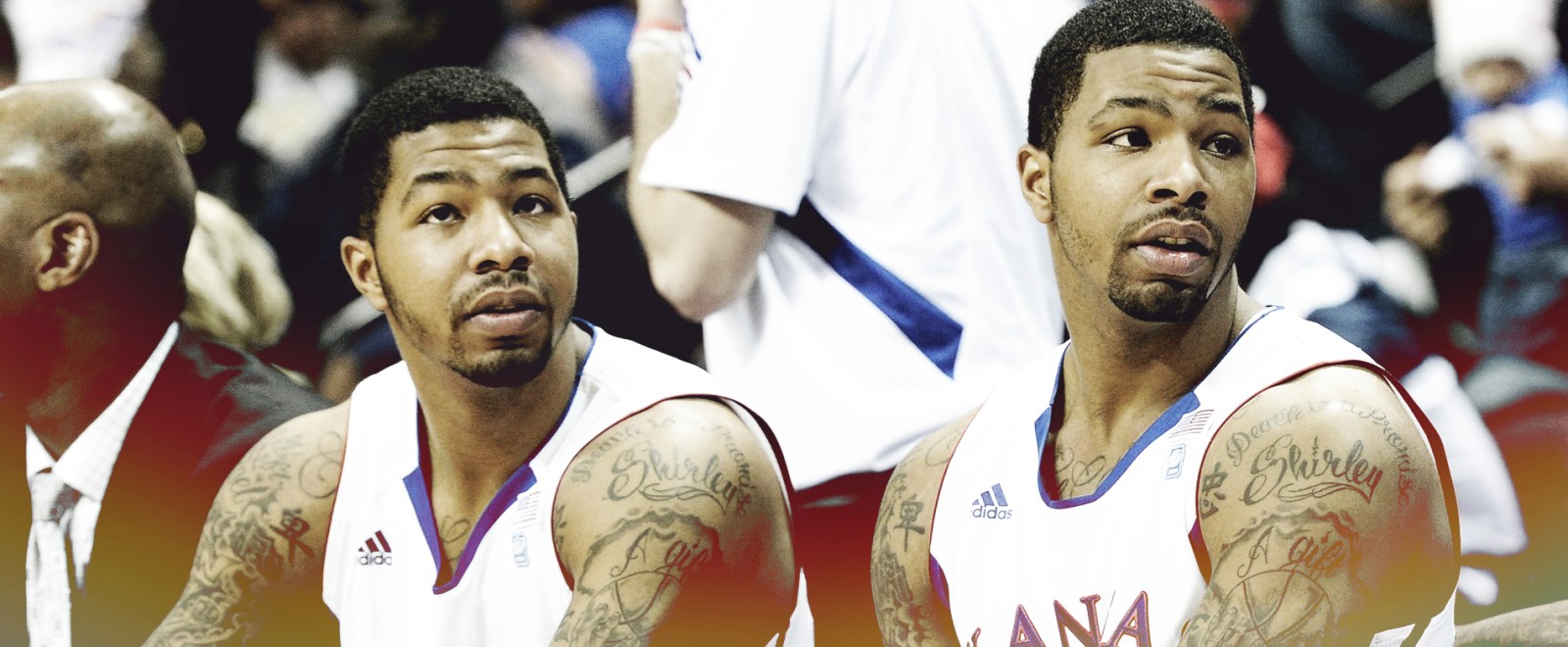
With tip-off for the 2008 NCAA National Championship Game just minutes away, Markieff and Marcus Morris settled into the living room of their grandmother’s North Philadelphia row home as the names of two of college basketball’s most prominent programs flashed across the TV in front of them.
On one side was Memphis, 38-1 entering that evening’s game. The team was led by John Calipari, college basketball’s most famous coach, and Derrick Rose, college basketball’s top pro prospect and the soon-to-be No. 1 overall pick in the NBA Draft. On the other side was Kansas, a college basketball blue blood, featuring a roster stacked with NBA talents like Mario Chalmers, Darrell Arthur, and Brandon Rush, and led by Bill Self, one of the country’s most revered coaches.
The Morris twins knew the players. They knew the coaches. They knew them all better than most. They were the only two viewers who over the previous two years had committed to play for both schools. They had first committed to Memphis in November 2006. They decommitted the following summer. They recommitted in July. They decommitted once again in September, then committed to Kansas in November.
But now, five months later, and unbeknownst to anyone—friends, family, even the schools themselves—they were once again unsure. At the very least, the eldest (by seven minutes) of the two was. Markieff felt a connection to Memphis. The urban atmosphere and culture reminded him of the Hunting Park neighborhood where he and his brother grew up.
Marcus, however, was still pushing Kansas. He’d fallen for its tradition and practical benefits. When the whole recruitment process had begun, their high school coach had written out a list of questions to help guide their decision. How many players have the schools sent to the NBA? Will you play right away? What’s the roster look like? Their answers had directed them to Kansas. Nothing had changed in Marcus’ mind.
The two went back and forth. Neither budged.
Separating wasn’t an option. The twins were as close to siamese as two non-physically connected humans could be. Markieff and Marcus needed a tie-breaker.
“We were like, ‘Shit, whoever wins this game, that’s the school we’re going to go to,’” Marcus says 12 years later. “We figured we’d leave it up to that.”
The clock flicked past 9 p.m. Surrounded by family, the twins watched as the Kansas and Memphis starting lineups strolled onto the Alamodome floor.
Sitting in their grandmother’s living room, they felt relieved. They’d spent almost four years torn by the decision, making sure to seize control of the recruitment process from the start. Their needs were the ones prioritized, not those of the coaches and schools. They’d reneged on commitments, questioned and even defied college basketball royalty, flipped the script, and done the selling themselves.
If they needed any assurance that their process had been strong, that their instincts had been right, all they needed to do was glance at the names of two schools competing for a championship on TV. And so why not, thought Marcus and Markieff, leave their fate in the hands of chance?
Referee Ed Hightower strutted to center court. He tossed the ball into the air.
“And college basketball’s biggest night,” exclaimed CBS broadcaster Jim Nantz, “is underway.”
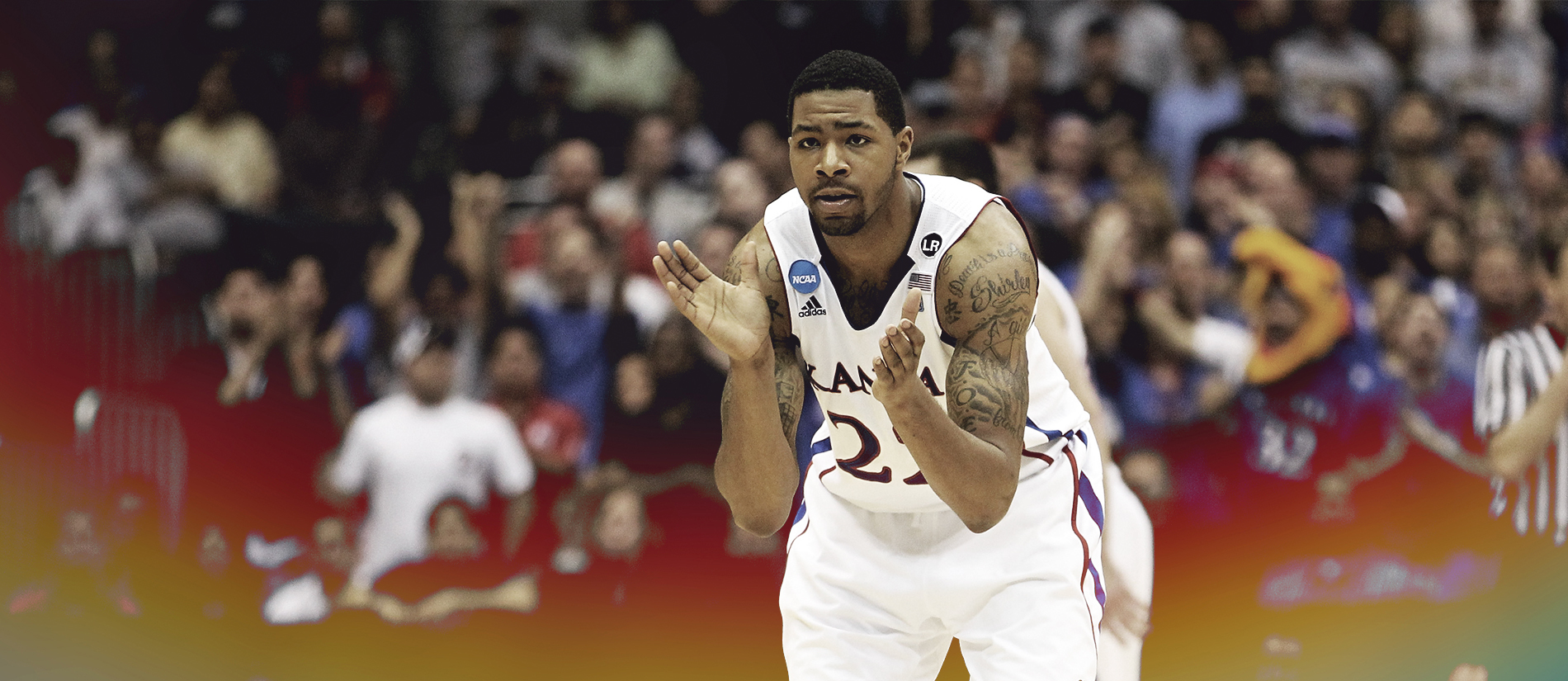
They never expected to go college. “No one in our family went,” Markieff says. Their road there began when they were in the seventh grade, when one day, while playing in the schoolyard, they heard a man shout out a question.
“How tall are you guys?”
The twins looked up. The man asking was one of the school’s football coaches. He held a phone in his hand.
“About 6’5,” they said. The coach raised the phone up to his ear.
“I’m standing here in the playground,” he told the man on the other line, a cousin of his and local basketball coach named Dan Brinkley, “and there are these twins here and they say they’re, like, 6’5.”
Later that week, Brinkley was driving down Philadelphia’s Broad Street when he spotted a pair of twins walking the opposite direction, toward Erie, towering above their friends.
That has to be them, he thought.
He turned around, parked his car and followed them home. He asked them if their mom was around. They pointed through the closed screen door. A woman, Angel Morris, emerged onto the porch. Brinkley told her who he was, how he’d spent years coaching and mentoring kids in the area, how if she entrusted him with her son’s futures he could secure them college scholarships. Then he handed Angel her his phone.
“Call anyone in there,” he said. “Ask them about Coach Dan.”
Angel, a single mom who worked at Temple University Hospital, took the phone. She disappeared inside. A few minutes later she opened the door.
“OK,” she said, “you can have my boys.”
Football was the twins’ first passion — Marcus played quarterback, Markieff first played center, then later on tight end — but they were willing to give basketball a try. By the time they were sophomores. both had shot up to about 6’9. The colleges, mostly local, started coming around. As juniors, they led Brinkley’s Prep Charter High School basketball team to a state title.
More schools expressed interest. Marcus and Markieff came back the following season even better. “I had to start telling them that summer to stop coming in so much,” Rahim Washington, a Prep Charter assistant coach at the time, said. “They were spending every day in the gym.” More schools took notice, from the Atlantic 10 to the Big East. Kentucky head coach Tubby Smith visited. Letters filled the family mailbox. The twins kept the first few.
“But it became so many we had to throw them out,” Marcus says.
“They were all straightforward, no special shit,” Markieff says.
And anyway, they preferred that Brinkley take the lead. “We didn’t know anything about that stuff,” Markieff says. “We didn’t know who was who. He told us that all we had to do was hoop, keep doing what we’ve been doing, and he’d take care of the rest.”
Brinkley and Washington would huddle in Brinkley’s office and bounce schools off each other. They’d analyze lineups, study which coaches had fared the best at developing forwards, predict which schools would have multiple front court openings. That last part was key.
“I had a phone call with (North Carolina head coach) Roy Williams one time and he was like, ‘We want you to come to school here but we only have one scholarship,” Markieff says. “I was like, ‘No coach, it doesn’t matter what school it is, we ain’t doing it.”
“Us going to school together wasn’t even a conversation,” Marcus says. “It was something that was just understood.”
“The two did everything together,” Washington says. “They came to school together, wore similar outfits, they pretty much ate the same thing.” They even molded their games in complementary ways — Marcus focused more on the perimeter, Markieff favored the paint — so their skills wouldn’t clash.
It was during their junior year that the twins first heard from Memphis. Derek Kellog, a longtime assistant of Calipari’s, got Brinkley’s number from a mutual friend. Calipari was in his fifth year with the school and “they were about to become one of the hottest teams in the country,” Brinkley said. He thought Calipari’s fast-paced, dribble-drive schemes would both accelerate the twins’ development and showcase their skills.
Calipari (who declined an interview request through a representative at the University of Kentucky, where he’s now the head coach) flew to Philadelphia. He met the twins and their family for dinner at their grandparents’ house, which they had moved into in December after a fire had ravaged Angel’s home.
“He was the first coach to come visit us in the hood,” Markieff said. “That he wasn’t scared to come to the inner city, that was different for us.”
Calipari was engaging, exhilarating, and warm. The twins were impressed, but not awed by his presence. “We didn’t really know the weight that college coaches had,” Markieff says.
They liked what they heard and, upon visiting the campus the following November, liked what they saw. Markieff says “it was like being at home,” a sentiment his brother shared.
“The way it was set up in the inner city, it felt like visiting a school in Philly,” Marcus says. “A lot of the players” — he mentions then-sophomore center Joey Dorsey, a Baltimore native — “were similar to us, too.”
They whittled the decision down to Memphis, Kentucky, Indiana, and La Salle. On Nov. 16, in the midst of their senior year, Brinkley organized a press conference for them in the school auditorium. They sat at a table alongside Angel.
Markieff pulled out a blue Memphis baseball hat.
“I’ve been with him for 17 years,” Marcus said. “Why leave him now?” Markieff placed a matching hat on his younger brother’s head.
Brinkley texted Calipari the news.
“They were showing us the most interest,” Markieff says today. “It felt like the best fit.”
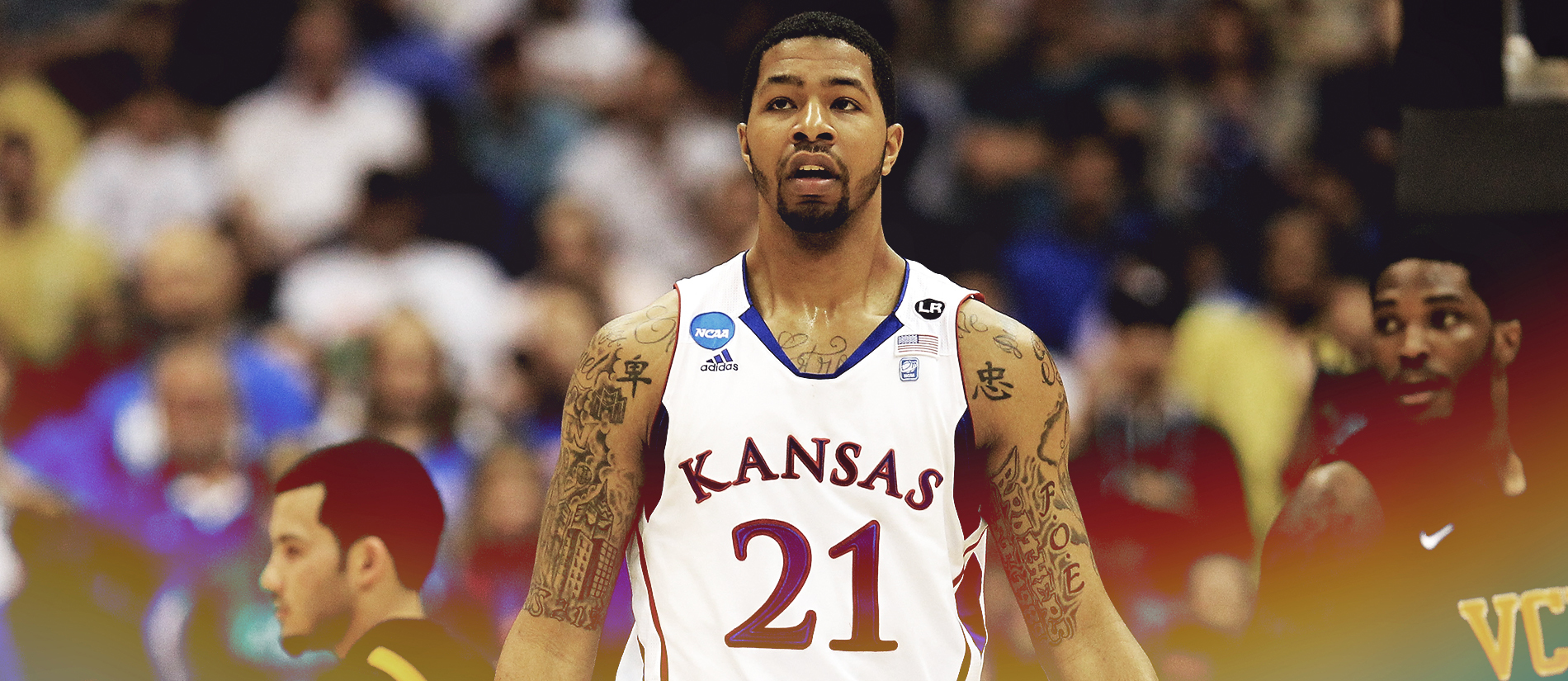
The twins capped off their Prep Charter careers that March. Memphis was next, except for one problem: Markieff and Marcus were young for their grade; they wouldn’t turn 18 until September. They decided they’d be better off — mentally, emotionally, physically — doing a year of prep school before heading off to college.
The twins, Brinkley, and reports from the time all say that this had been the plan all along, and that the brothers would re-sign with Memphis the following fall. But, according to Brinkley, “Calipari then decided he didn’t want that. He wanted them to come right away, even if they decided to redshirt. He said he could prepare them better if they were there.”
Rumors were also beginning to swirl that Calipari could soon leverage his Memphis success into a bigger job. “We didn’t think he would still be there with us,” Marcus says. So Brinkley began searching for other options.
Kansas piqued his interest. Their roster was full of players likely headed to the NBA within the next two years, meaning Marcus and Markieff would have more opportunities to play. He thought Self had an impressive history of developing forwards at both Kansas and Illinois, where he previously coached. He looked up the number for Self’s office and left a message with his secretary.
Self didn’t know much about Marcus or Markieff. “I hadn’t really heard of them until after they signed with Memphis,” he says. But he called Brinkley back.
“He told me that we didn’t know him,” Self recalls, “but that he had twins who could play and have good grades and are committed to Memphis but that they’re going to prep school and like Kansas.”
Self says he told Brinkley NCAA rules prohibited him from recruiting them until the fall. Brinkley sent him six tapes featuring clips and highlights anyway
The twins enrolled in Pennsauken Apex Academy in New Jersey and in July they told the Philadelphia Daily News that they were re-opening their recruitment. Upon hearing the news Calipari reached out to the twins. “I’m coming to see you,” he said.
Calipari and Kellogg boarded a plane to Philadelphia. They sat with the twins in their grandparents’ home, breaking down future lineups, where they thought Marcus and Markieff would play, what they thought they could do.
“The fact that Calipari flew out to see us, it felt like one of those things where he wasn’t going to leave the house until we told him we were coming,” Markieff says. So that’s exactly what they did.
“We just knew he wasn’t going to be there the whole time we were,” Marcus says.
“They wanted to see other schools,” Angel told a reporter at the time. “But as we sat down as a family and talked about it, everything worked out, and (Memphis) is exactly where we’re going and what we’re doing.”
Two months later, in early September and with school about to begin, the twins changed their minds again. The combination of it all — their concerns about Calipari’s future, their desire to enroll in prep school, their taking to the idea of playing for Kansas — had robbed Memphis of its gloss. It was time to find a new future home.
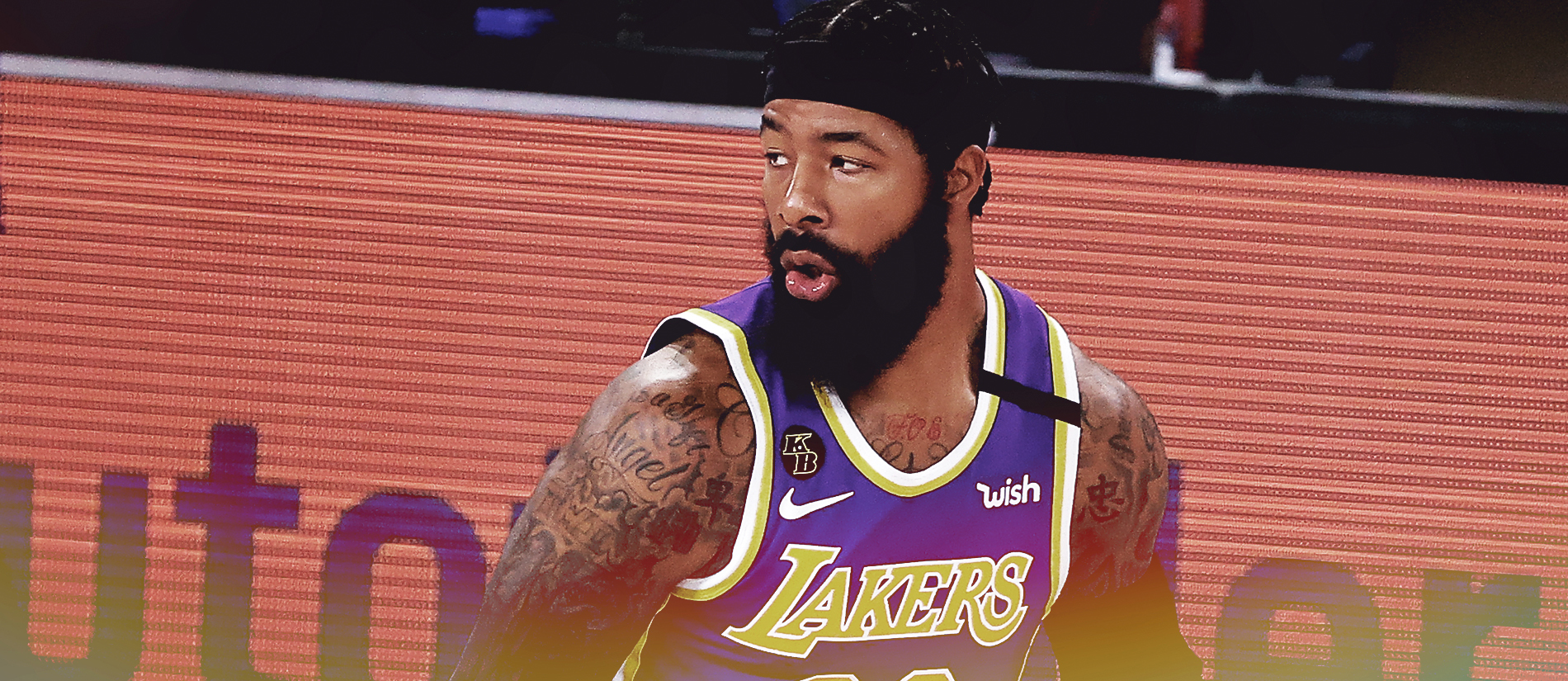
Self needed players. He’d likely lose five to the NBA the following summer. If some high school coach in Philly was offering him a pair of 6’9, nationally ranked forwards, he was more than happy to oblige. He and an assistant named Joe Dooley flew to Philadelphia to meet Marcus and Markieff at their school gym.
“Before that,” Marcus says, “we didn’t know who Bill Self was.”
Self and Dooley watched the twins workout. There were eight stations set up throughout the gym. Each station lasted about four minutes. The twins’ skills impressed the coaches, but something else stuck out, too.
“They were incredibly lazy,” Dooley says.
One brother only completed six stations before leaving for the bathroom. The other finished his at what Self and Dooley deemed an unacceptable pace. Afterward, Marcus and Markieff approached the Kansas coaches.
“On a scale of 1-to-10, how do you think we did?” they asked.
Dooley paused. He looked at them. “Minus two,” he said.
Still, Self was interested. Markieff and Marcus were both very large and both very good. Dooley took the lead on the recruiting, though “ I don’t even know if you can call it recruiting,” Marcus says. “Like, we literally don’t have one letter from Kansas. It was more like, ‘We want to go to your school, do you have spots?’”
Asked if the school ever dangled any additional benefits, Marcus says, “I know for a fact that Kansas never offered us shit.”
Dooley flew to Philadelphia a few times, had dinner with the family, and answered any questions Marcus and Markieff had. Dooley enjoyed them. He found them funny, smart, and “easy to talk to.”. Marcus and Markieff asked a lot about life in Kansas.
“We ain’t know nothing about the tradition of Kansas or any of that,” Markieff says. “We didn’t know nothing about Danny Manning, Paul Pierce, any of that.”
“All we did know,” says Marcus, “is that Wilt (Chamberlain) played there, because he was from Philly.”
In October, Marcus, Markieff, and Angel flew out to Kansas for their official visit. The trip got off to a rocky start. Lawrence was nothing like North Philly or Memphis. The amount of farmland they saw just on the drive from the airport to the school’s campus was jarring. The player tasked with showing the twins around — Chalmers and Rush — “Didn’t show us around the way we would (show recruits later on)to make sure you want to come to the school,” Marcus says.
“They were cool,” Markieff adds, “but it was boring.”
But Self had purposely invited the twins on the weekend of Late Night in the Phog, the school’s annual pre-season pep rally. Marcus and Markieff showed up at Allen Fieldhouse around 6 p.m on a Friday night. Rabid fans dressed in blue and white filled all 16,300 seats. Music blared over the speakers. Cheers filled the room.
“That shit was crazy,” Marcus says. “You could feel the tradition. We’d never seen anything like that.”
“It was just on another level,” says Markieff.
That experience combined with Brinkley’s advice was enough to win them over.
On October 31, the twins verbally committed.
“It all happened very fast,” Self says.
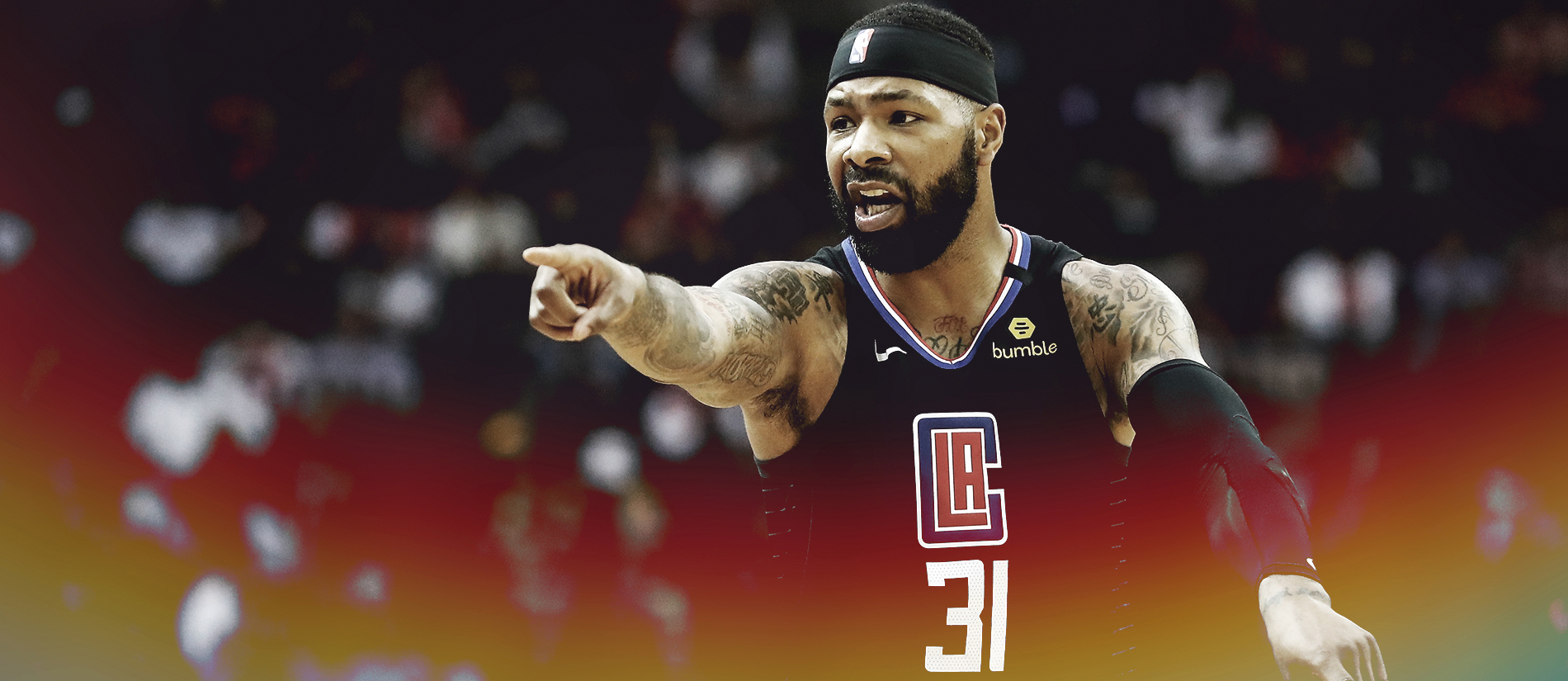
A little over five months later, Memphis and Kansas faced off in the National Championship Game. With 2:12 in the contest, Memphis forward Robert Dozier canned a pair of free throws, giving Calipari’s squad a nine-point lead. Marcus and Markieff exchanged a glance.
“We thought we were going to Memphis,” Marcus says.
It didn’t matter to them that they had signed a letter of intent to play for Kansas only two months earlier, meaning that if they reneged they’d be forced by NCAA rules to sit out a year, or that Calipari, unaware of their renewed interest, might not even want them back. Such obstacles, they figured, could be dealt with later on. Between them and Brinkley, there was no problem they couldn’t solve.
All that mattered in this moment was that Markieff was having doubts. He had felt a connection with Memphis. The problem was that there was no way he and Marcus were splitting up.
Kansas responded with a Darrell Arthur jumper, then stole the inbounds pass and drilled a three. Memphis missed a bunch of free throws. With 10.8 seconds remaining, and down by three, Kansas guard Sherron Collins dribbled the ball up the floor and fumbled it into the hands of Chalmers. Chalmers rose up from deep and buried a three with 2.1 seconds left.
“Unbelievable,” cried out Jim Nantz.
Kansas outscored Memphis by seven in overtime, giving them a 75-68 win.
“The way that shot happened, it confirmed it all for us,” Marcus says.
Says Markieff, “It was like it was meant to be.”
The twins moved to Kansas that summer. Angel came along. Marcus and Markieff struggled at first. Self is notorious for his grueling training camps and, in Markieff’s words, “our workout styles were opposites. There were times where we couldn’t believe how much shit we were doing.”
Says Marcus, “There was a lot of time where we wanted to hang them up, through the shoes over the wire.”
But they never did, and three years later Marcus was named Big 12 Player of the Year while Markieff earned second-team All-Big 12 honors. That spring, following their junior season, the twins declared for the Draft. Both were selected in the first round.
“Kansas changed us,” Marcus says. “We’re grateful for that.”
Calipari, meanwhile, left Memphis for Kentucky in March 2009.
In February 2020, Marcus’ No. 22 jersey was retired by Kansas. Self says the school now recruits forwards by showing highlights of the twins. He’s also dubious about their claim that had Chalmers’ jumper bounced out missed they might not have enrolled.
“I don’t believe that,” he says, laughing. “Have you been around them? They’re ridiculous.”
But Marcus and Markieff insist the story is true, even if no one else was aware of what was riding on that shot. “I know my mom would have been like, “You better not base your future off one game,” Marcus says.
“I don’t know, it worked for us.”
Yaron Weitzman is a freelance writer and the author of Tanking to the Top: The Philadelphia 76ers and the Most Audacious Process in the History of Professional Sports. Follow Yaron on Twitter, @YaronWeitzman.
